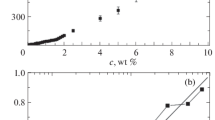Abstract
Thermally stimulated depolarization currents (TSD) are analyzed as a function of conditions on the contacts (within the framework of blocking and unblocking the electrodes). It is shown that in the case of the blocking electrodes the TSD can be due to “resorption” of the volume charge, neutralization of the volume charge because of equilibrium conduction, and repolarization in the internal field. In the case of the unblocking electrodes, the TSD depends substantially on the electrical neutrality of the object. The influence of the diffusion component of the conduction current on the TSD current is considered.
Similar content being viewed by others
Literature cited
M. E. Borisova and S. N. Koikov, in: Theses of Reports to an All-Union Scientific Conference on Physics of Dielectrics and New Domains of Application [in Russian], Karaganda, (1978), pp. 22–24.
S. C. Agarwal, Phys. Rev. B,10, 4340–4350 (1974).
P. Muller, Phys. Status Solidi (a),28, 521–527 (1975).
J. Van Turnhout, “Current and charge TSD of polymer electrets resulting from the motion of excess charges,” in: M. M. Perlman (editor), Electrets, Charge Storage, and Transport in Dielectrics, (1973), pp. 250–251.
C. Bucci, R. Fieschi, and G. Guidi, Phys. Rev.,148, 816–823 (1966).
M. P. Tonkonogov and V. A. Mironov, Izv. Vyssh. Uchebn. Zaved., Fiz., No. 9, 65–70 (1973); No. 10, 16–19 (1973).
Yu. Ya. Tkach, Fiz. Tekh. Poluprovodn.8, 238–261 (1974).
Yu. A. Gorokhovatskii, Izv. Akad. Nauk LatvSSR, Ser. Fiz.-Tekh. Nauk, No. 3, 15–22 (1972).
V. A. Ogloblin, Tr. Mosk. Inst. Elektron. Mash., No. 34, 80–85 (1976).
A. N. Gubkin and O. N. Popov, in: Theses of Reports, op. cit., pp. 94–95.
Yu. A. Gorokhovatskii, Izv. Akad. Nauk LatvSSR, Ser. Fiz.-Tekh., No. 1, 43–52 (1973).
A. Kessler and J. E. Caffyn, Phys. C,5, 1134–1152 (1972).
P. R. Moran and E. B. Podgorsak, Phys. Lett.,44A, No. 4, 237–238 (1973).
Yu. A. Gorokhovatskii, Uch. Zap. P. Stuchki Latv. Gos. Univ.,208, No. 2, 129–132 (1974).
V. F. Zolotarev, D. G. Semak, and D. V. Chepur, Zh. Eksp. Teor. Fiz.,52, No. 4, 849–853 (1967).
V. N. Vertoprakhov and E. G. Sal'man, Elektron. Tekh., Ser. 8, No. 8, 94–99 (1972).
H. J. Wintle, J. Appl. Phys.,42, 4724–4730 (1971).
J. G. Simmons and G. S. Nadkarni, Phys. Rev. B,6, No. 12, 4815–4827 (1972).
Yu. A. Gorokhovatskii, A. N. Rodionov, and V. I. Zhdanok, Izv. Akad. Nauk LatvSSR, Ser. Fiz-Tekh., No. 2, 21–28 (1976).
Author information
Authors and Affiliations
Additional information
Translated from Izvestiya Vysshikh Uchebnykh Zavedenii, Fizika, No. 12, pp. 7–13, December, 1979.
Rights and permissions
About this article
Cite this article
Gorokhovatskii, Y.A., Gubkin, A.N. Influence of the boundary conditions on the thermostimulated depolarization current. Soviet Physics Journal 22, 1255–1260 (1979). https://doi.org/10.1007/BF01220808
Received:
Issue Date:
DOI: https://doi.org/10.1007/BF01220808




